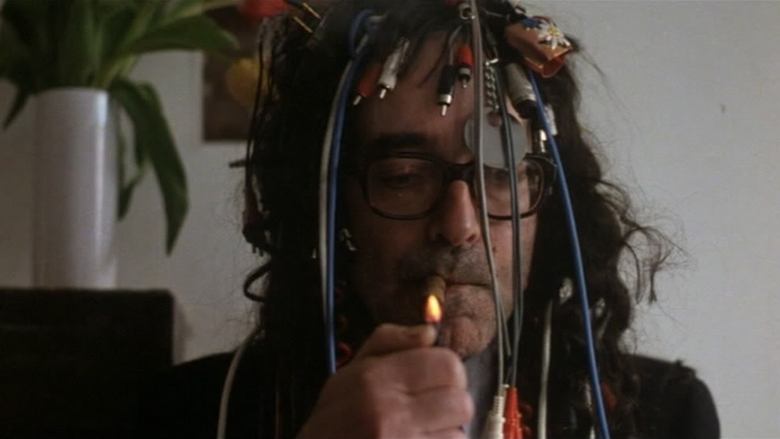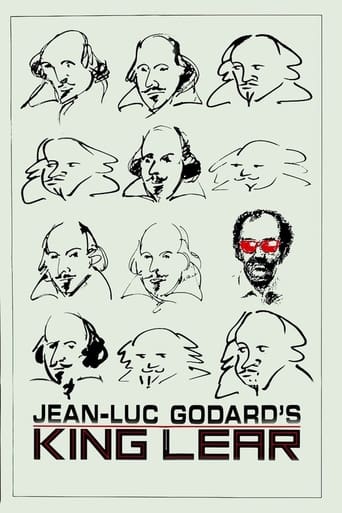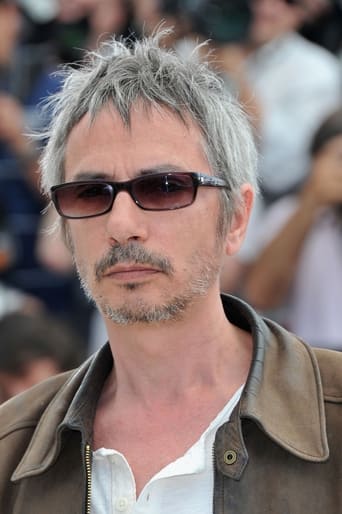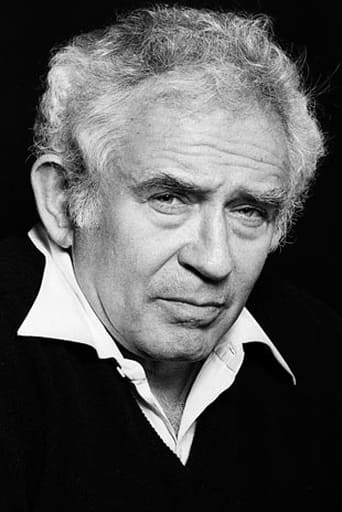A descendant of Shakespeare tries to restore his plays in a world rebuilding itself after the Chernobyl catastrophe obliterates most of human civilization.
Reviews
Overrated and overhyped
Pretty good movie overall. First half was nothing special but it got better as it went along.
It's easily one of the freshest, sharpest and most enjoyable films of this year.
The movie's neither hopeful in contrived ways, nor hopeless in different contrived ways. Somehow it manages to be wonderful
Everything returns to normal after Chernobyl. That is, everything but art. Most of the great works are lost, and it is up to people like William Shakespeare Junior the Fifth to restore the lost artwork of the human race. He finds strange goings-on at a resort enough to remind him of all the lines of the play, dealing with mob boss Don Learo and his daughter Cordelia, a strange professor named Jean Luc-Godard, who repeatedly xeroxes his hand for no particular reason.I gave this film a low rating primarily because of the way I saw it, with a low quality of picture and sound. I think there is a lot of potential here, but I wasn't fully able to enjoy it. Oddly, I don't think any people have seen this film, despite the names involved. Woody Allen? Norman Mailer? Molly Ringwald? This should be a cult classic. Has it received a proper release?
This is by far one of the weirdest films ever made, as I've said before. Godard is probably my second favorite director (right behind Kitano), and this isn't his first really weird film or anything (I'd go so far as to say all of his films in his unfairly-neglected-but-superior "late period" are quite strange in some way, either in their fractured narrative, or in their hardcore deconstruction of typical movie-making -- "Where's the story?" indeed...). But this is kind of a mix of everything he'd done with his newer stuff, when it came out; all the themes and elements and ideas he had been exploring, and it even predicts a bit of his stuff after this. People usually get interested in this film for its genesis and some of the bizarre happenings in this film (Godard signs a contract on a napkin; Godard recorded telephone conversations with producer and put it in the film, which peeved the producer off; Godard never actually reads past page 3 of King Lear itself; this film was made from like 4 or 5 different aborted scripts cobbled together; a father and daughter sign on to do this movie, do 5 takes or so, and then walk off the set in disgust, all of which is captured in the movie, with a voice-over explaining this; Woody Allen was hired to be in this film and he had no idea what he was doing so he drinks some coffee, puts some safety pins in some film, recites a few verses from the play King Lear and that's about it).Well, it goes far beyond that, as far as strangeness is concerned... seeing Molly Ringwald in a Godard film is just bizarre, first of all (keep in mind she was HUGE at the time; Pretty In Pink and all that stuff). Second of all, Godard's narration is absurd. I mean, you can barely even tell what he's saying, in English (this is also his only English film from beginning to end!). He might as well have been recorded through a voice box. Godard plays a guy with a headdress made of hi-fidelity wires, so he can jack himself into the unknown at any time. He is looking for "The image". Since Godard never actually read King Lear, the film instead asks if King Lear is even an important work of art, if it's even valid a radioactive, post-Chernobyl landscape. So, the main actor (who actually says the line, "Oh yeah, by the way, my name is William Shakespeare Junior the Fifth." in a comical tone) is "searching" for, uh, something, and he encounters a bunch of crazy characters, in an extremely, EXTREMELY fractured narrative, with scenes ending abruptly, double (sometimes triple) voices of characters constantly on the soundtrack, and pretty much everything crashing, colliding, and being completely out of sequence, out of time, out of tune. Oh, let's not forget the soundtrack, which is made of slowed-down and electronically-manipulated versions of Beethoven symphonies; also, there is a loud, annoying, seagull sound about every 3 minutes in the movie.Sounds like a disaster, doesn't it? Well, I gotta say, it's one of the best films -- not just by Godard -- but EVER. Even beyond the "strangeness" that attracts me, there is a strange, otherworldly beauty to the proceedings. Godard designed the film to fail, but he did so in a way that's really, really interesting, and is actually extremely experimental, especially when you consider that this was designed to be a mainstream film! Godard himself said he never got page 3 of King Lear, it didn't interest him at all... he said the film was the first 3 pages of King Lear and the rest of it is him trying to "Get past" the rest of the play. Which is hilarious, absurd, and reason enough to check it out...A powerful film, misunderstood to be certain, groundbreaking and unconventional in every way, I'd say anyone into Jodorowsky and stuff like that should probably want to seek this out and have their mind blown.
It's interesting that director Jean-Luc Godard flashes up the title card King Lear: Fear and Loathing throughout this film, as he himself appearing on the screen looks like Hunter S. Thompson...that is, if HST was French and on a mix of downers and trippers. Upon watching Godard's King Lear the first time, I understood this much - William Shakespeare Junior the Fifth (Peter Sellars) is in the process of writing something for the Cannon Group in a post-Chernobyl mind-f*ck parallel universe, where art and movies are faded memories and where Don Learo (Burgess Meredith) and his daughter Cordelia (Molly Ringwald) talk of separate philosophies and emotional struggles. Then, other than that, I was totally befuddled by the cinematic approach Godard was taking to the material. And yet there was something about the film that intrigued me, how there was such a height of intellectualism going on from Godard's head to the celluloid that it almost reverberated to ludicrous-ness, so I watched it again, giving it another shot.What King Lear does accomplish, at least up to a point, is that Godard's trying to get inside the mind of a writer (if not himself, which is more than likely the case, then of the spawn of Shakespeare), as he tosses about various ideas and nonsense to pound out a story and characters. The film also gives some interesting and true improvisation time for an actor like Meredith, and once in a while Godard's Professor Pluggy makes a point of fascination (i.e. the significance of images and emotions). What King Lear doesn't accomplish is some sense, even sense that intellectuals could be able to latch onto. Godard's basically making a film for himself, delving into themes and stylistic techniques that only he would understand, and since he limits what the audience can latch onto and comprehend of what philosophical goals and meanings he's derived from Shakespeare's classic, it's pretentious more often than not. The mis-en-scene is a bizarre contrast, as everything in the camera-work is clear and lovely, while the audio side of things almost works to annoy the viewer. The sounds of seagulls are practically inexplicable (unless he's trying to have the POV of the character every time a seagull chirps, which is over-the-line for me), the over-lapping of puzzling Shakespearian-esquire philosophy over some of the dialog is too much to concentrate on and digest, and the way Godard talks he might as well be speaking through a voice box.So, I think that King Lear is a bit of a mess, but for some reason I don't think it's a failure. It's the kind of mess that only a director like Godard could go for and make his own. A hack wouldn't even KNOW how to use such weird narrative devices like this man does. The film could even be of use to be dissected by someone scene-by-scene (although it could perplex someone enough to destroy the videotape their watching and curse Godard for all eternity), and as an experiment of treating Shakespeare it's not the worst in history. But I would not want to test myself with this again. Even Woody Allen (who bookends the end of the film with only minimal Shakespeare dialog and hands amusingly fiddling on the film) must've been scratching his head through most of this. So it's recommendable not so much as an enjoyable poetic musing like Band of Outsiders or even Pierrot Le Fou's oddball mixture. Reall, it's a challenge for a film buff that'll at best intrigue and get thinking and at worst be something to throw up in the air and shoot at with a bebe gun.
Godard's listless crapfest is a big waste of time. I mean- it's fine if you want to pick one scene from a play and analyse it for an hour and a half; it's fine if you want to do this in an obscure semi-story way that only become the tiniest bit clear after having watched the whole thing.But when it's constructed as an endurance test, with the director holding the audience in contempt- I mean, why waste your time? (To the end of making your experience as unpleasant as possible, Godard shows up as a "professor", mumbling unintelligible profundities. And then throws piles of squealing seagulls and vari-speeded music onto the soundtrack. Thanks for reminding us that film is a constructed medium, professor!)There were a couple effective scenes, but they were immediately undermined by what followed. I did think a little about Lear, but more to keep myself occupied than from any theses the film presented.And a caveat to anyone considering seeing this because the IMDB credits list Woody Allen: don't bother; he's only in the flick for a few minutes at the end and barely says anything.To review: avoid.Rating: 3 out of 10 (very poor)
Top Streaming Movies






















